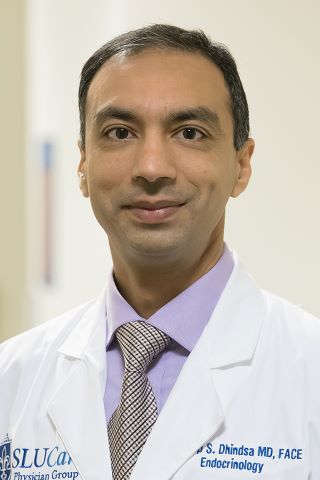Low Testosterone Levels in Men Are Linked to More Severe Cases of COVID-19
Maggie Rotermund
Senior Media Relations Specialist
maggie.rotermund@slu.edu
314-977-8018
Reserved for members of the media.
ST. LOUIS - Low testosterone levels in men are linked to more severe cases of COVID-19, according to Saint Louis University School of Medicine and Washington University School of Medicine researchers.
The study, “Relationship of circulating sex hormones with inflammation and disease severity in COVID-19,” published online May 25 in JAMA Network Open.

Sandeep Dhindsa, M.D., a SLUCare endocrinologist and the director of SLU’s Division of Endocrinology, Diabetes and Metabolism, is first author on the paper.
Abhinav Diwan, M.D., a cardiologist and professor of medicine at Washington University, is the study’s senior author.
The cohort study looked at COVID-19 patients hospitalized at Barnes-Jewish Hospital between March-May 2020.
In the study, researchers measured several hormones in blood samples from 143 patients (90 men and 62 women) who came to Barnes-Jewish Hospital with COVID-19 symptoms and confirmed cases of the illness.
The researchers measured hormone levels in the hospitalized cohort at days 3, 7, 14 and 28, for as long as the patients remained hospitalized. Dhindsa said 28 men and 14 women remained hospitalized beyond day 14.
In addition to testosterone, the investigators measured levels of estradiol, a form of estrogen produced by the body, and IGF-1, a growth hormone.
“The most important causal factor for low testosterone is likely to be severe illness,” Dhindsa said. “In addition, it is possible the men with low testosterone prior to getting COVID are more likely to have low testosterone during the illness as well. However, we could not test that hypothesis since we do not have pre-COVID samples on these patients.”
Low testosterone can also be attributed to aging, obesity and diabetes.
Diwan and Dhindsa attended medical school together, but this is their first research collaboration.
“We have discussed collaboration on various research themes, but this is our first publication together,” Dhindsa said. “This project was initiated soon after the pandemic started - my role was based on my expertise in sex hormones and clinical studies, while Dr. Diwan’s role was based on his expertise in cellular signaling, access to samples at Wash U and his collaborations with other Wash U investigators.”
The findings suggest that low testosterone concentrations may play a role in worse outcomes for men with COVID-19, but researchers stress the need for further study.
Dhindsa said he sees this study leading to multiple future research questions, including:
- Compared to men with normal testosterone, are men with low testosterone more likely to get severely ill when they contract COVID (or other respiratory illnesses)?
- After acute illness of COVID, will testosterone replacement help in the recovery process?
- Can we investigate the paradox of low testosterone in serum but increased sex hormone signaling in immune cells in men?
This work was supported by the National Institutes of Health (NIH), grant numbers R37 AI049653, P30 DK020579, HL107594 and HL143431; and a grant from The Foundation for Barnes-Jewish Hospital to facilitate data collection from the WU350 cohort, which supported these studies. These studies also were supported by the Washington University Institute of Clinical and Translational Sciences, grant number UL1TR002345 from the National Center for Advancing Translational Sciences (NCATS) of the NIH.
This study used Washington University’s COVID-19 biorepository and was conducted as a collaboration of the university’s Institute of Clinical and Translational Sciences (ICTS), which includes Saint Louis University School of Medicine.
Saint Louis University School of Medicine
Established in 1836, Saint Louis University School of Medicine has the distinction of awarding the first medical degree west of the Mississippi River. The school educates physicians and biomedical scientists, conducts medical research, and provides health care on a local, national and international level. Research at the school seeks new cures and treatments in five key areas: cancer, liver disease, heart/lung disease, aging and brain disease, and infectious diseases.

















